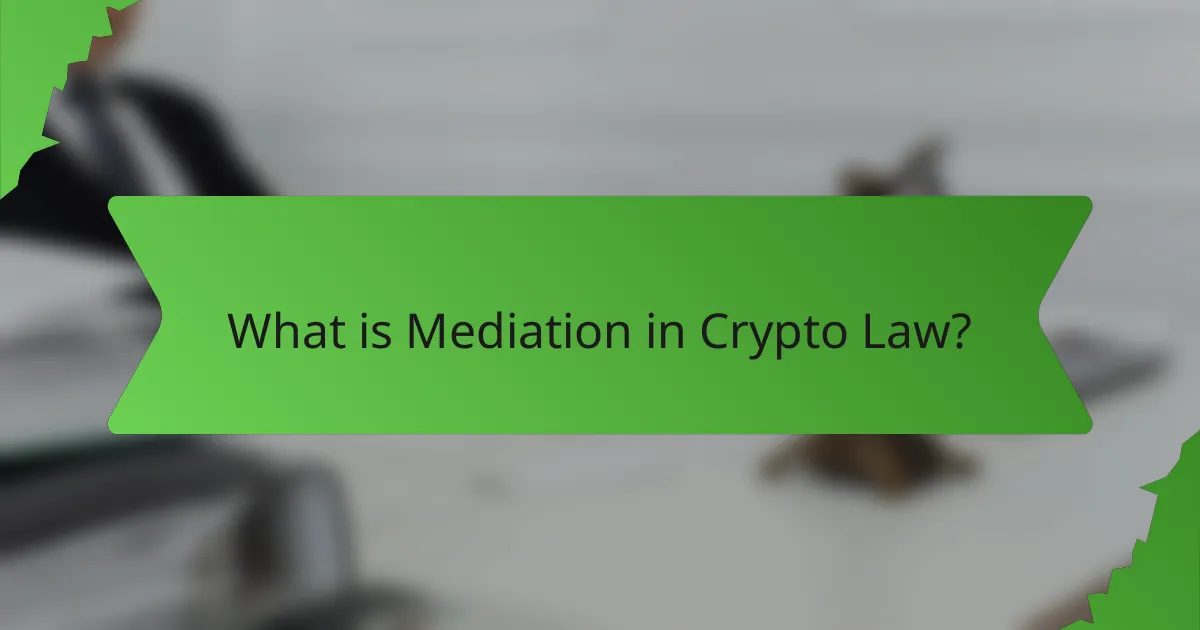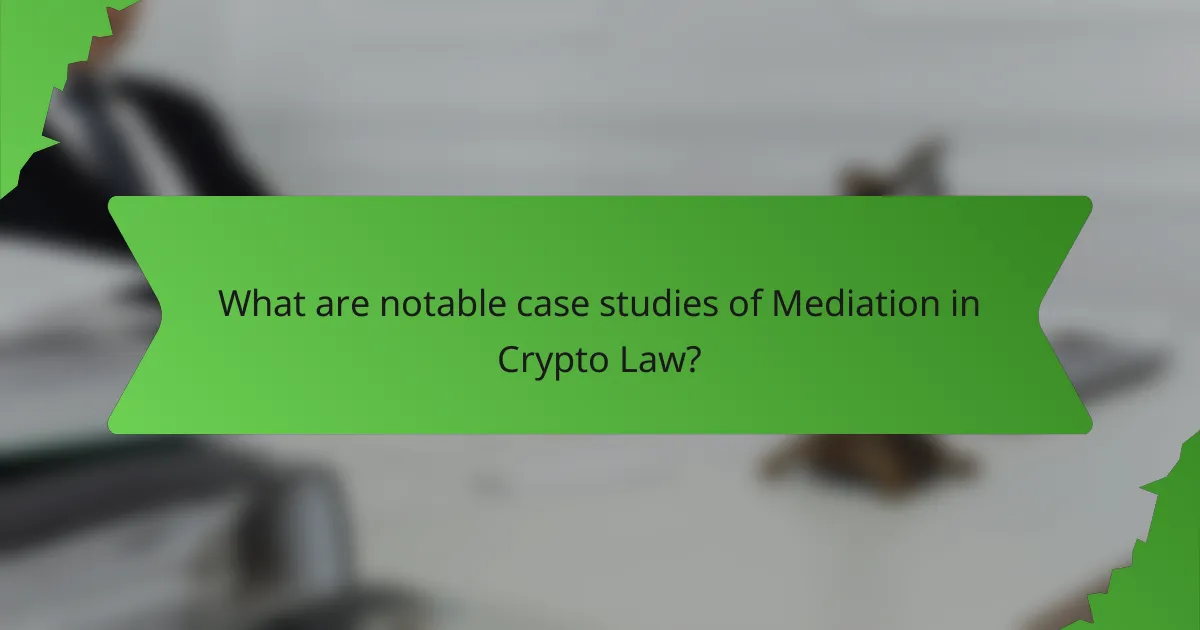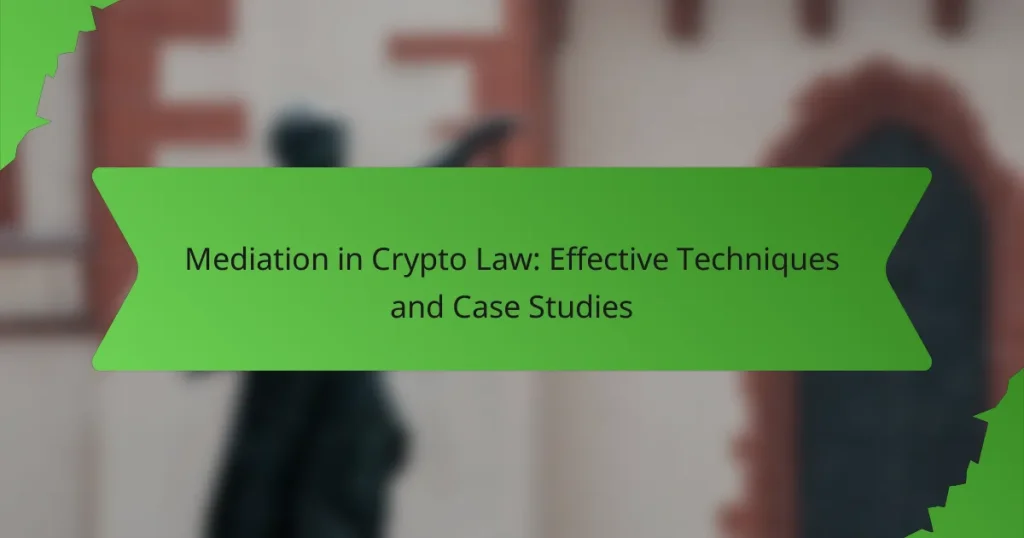Mediation in crypto law is a process involving a neutral third party to resolve disputes related to cryptocurrencies and blockchain technology, offering a cost-effective and efficient alternative to litigation. This approach facilitates negotiation, allowing for tailored solutions that address specific needs of the parties involved. Effective mediation techniques include interest-based negotiation, confidentiality agreements, and expert facilitation, which enhance collaboration and protect sensitive information. Case studies illustrate successful mediation outcomes in scenarios such as disputes between cryptocurrency exchanges and users, as well as conflicts between blockchain startups and investors, showcasing the growing importance of mediation in the evolving crypto landscape.

What is Mediation in Crypto Law?
Mediation in crypto law refers to a process where a neutral third party helps resolve disputes involving cryptocurrencies or blockchain technology. This method aims to facilitate negotiation between parties without resorting to litigation. Mediation is often preferred due to its cost-effectiveness and efficiency. It allows for more flexible solutions tailored to the needs of the parties involved. The use of mediation in crypto disputes is growing as the industry matures. Its effectiveness is supported by various case studies highlighting successful resolutions. Mediation can address issues such as contract disputes, fraud allegations, and regulatory compliance challenges.
How does Mediation function within the context of Crypto Law?
Mediation functions as a dispute resolution method within the context of Crypto Law by facilitating negotiations between parties involved in cryptocurrency-related conflicts. It allows disputants to reach mutually agreeable solutions without resorting to litigation. Mediators assist in clarifying issues, identifying interests, and exploring options for resolution. This process is particularly valuable in the rapidly evolving crypto landscape, where legal frameworks may be unclear. Mediation can also save time and costs compared to traditional legal proceedings. Additionally, it fosters communication and preserves relationships between parties, which is crucial in the collaborative environment of the crypto industry.
What are the key principles of Mediation in Crypto Law?
The key principles of mediation in crypto law include neutrality, confidentiality, and voluntary participation. Neutrality ensures that the mediator remains impartial and does not favor any party. Confidentiality protects the information shared during mediation, fostering open communication. Voluntary participation means that parties engage in mediation willingly, allowing for a more cooperative environment. These principles are essential for effective dispute resolution in the evolving landscape of cryptocurrency regulations. They help build trust among parties and promote fair outcomes.
How does Mediation differ from other dispute resolution methods in Crypto Law?
Mediation in Crypto Law is a collaborative dispute resolution method that emphasizes negotiation between parties. Unlike arbitration or litigation, mediation does not involve a third party making a binding decision. Instead, a mediator facilitates communication to help parties reach a mutually acceptable solution. This approach allows for more flexibility and control over the outcome compared to other methods. Mediation is often less formal and can be quicker, reducing costs associated with prolonged disputes. Furthermore, parties maintain confidentiality in mediation, which is crucial in the sensitive realm of crypto transactions. In contrast, arbitration often results in public decisions, and litigation is typically a matter of public record. Thus, mediation provides a unique avenue for resolving disputes in Crypto Law that prioritizes collaboration and confidentiality.
What are the advantages of using Mediation in Crypto Law?
Mediation in crypto law offers several advantages. It provides a faster resolution compared to traditional litigation. Mediation can reduce legal costs significantly for all parties involved. It allows for more flexible solutions tailored to specific disputes. Confidentiality is maintained, protecting sensitive information from public exposure. The process fosters better communication between conflicting parties. It often preserves business relationships that might be damaged in court. According to a study by the International Institute for Conflict Prevention and Resolution, mediation resolves disputes in about 70% of cases. These factors make mediation a preferred method in the evolving landscape of crypto law.
How can Mediation save time and costs in Crypto disputes?
Mediation can save time and costs in crypto disputes by providing a faster resolution process. Traditional litigation can take months or years, while mediation typically resolves issues in a matter of weeks. This expedited timeline reduces legal fees, which can accumulate significantly during prolonged disputes. Mediation also allows parties to maintain control over the outcome, leading to more satisfactory resolutions. This can prevent costly appeals or further legal actions. Additionally, mediation sessions are generally less formal and can be conducted online, saving travel time and expenses. Studies indicate that mediation can resolve disputes at a fraction of the cost of litigation, making it a financially viable option for parties involved in crypto disputes.
What role does confidentiality play in Mediation processes?
Confidentiality plays a crucial role in mediation processes. It ensures that all discussions remain private and cannot be used in subsequent legal proceedings. This confidentiality encourages open communication between parties. When parties feel secure, they are more likely to share their true interests and concerns. The confidentiality principle is often reinforced by legal frameworks governing mediation. For instance, many jurisdictions have laws that protect the confidentiality of mediation communications. This legal backing further promotes trust in the mediation process. Overall, confidentiality is essential for effective conflict resolution and fostering collaboration.

What effective techniques are used in Mediation for Crypto Law?
Effective techniques used in mediation for crypto law include interest-based negotiation, confidentiality agreements, and expert facilitation. Interest-based negotiation focuses on the underlying interests of the parties rather than their positions. This approach fosters collaboration and leads to mutually beneficial solutions. Confidentiality agreements are crucial in crypto law mediation. They protect sensitive information and encourage open dialogue between disputing parties. Expert facilitation involves bringing in professionals with specialized knowledge in cryptocurrency and blockchain technology. This expertise helps clarify complex issues and guides discussions toward resolution. These techniques enhance the effectiveness of mediation in resolving disputes within the crypto sector.
How do Mediators facilitate communication in Crypto Law cases?
Mediators facilitate communication in Crypto Law cases by acting as neutral third parties. They help clarify complex legal terms and concepts related to cryptocurrency. This clarification reduces misunderstandings between parties. Mediators also encourage open dialogue, allowing each party to express their concerns. They guide discussions to keep them focused and constructive. By managing emotions, mediators prevent conflicts from escalating. Additionally, they assist in finding common ground between disputing parties. This collaborative approach fosters a more amicable resolution. Evidence shows that mediation can lead to quicker settlements compared to traditional litigation.
What techniques do Mediators employ to manage conflicts?
Mediators employ various techniques to manage conflicts effectively. They use active listening to understand all parties’ perspectives. This technique fosters a safe environment for open dialogue. Mediators also facilitate communication between conflicting parties. They help clarify issues and identify interests. Additionally, they guide discussions towards mutually acceptable solutions. Mediators may employ brainstorming sessions to generate options. They also utilize reframing to shift negative perceptions. These techniques enhance collaboration and promote resolution.
How can technology enhance Mediation processes in Crypto Law?
Technology can enhance mediation processes in crypto law by improving efficiency and transparency. Digital platforms facilitate real-time communication between parties. Blockchain technology ensures secure and tamper-proof records of agreements. Smart contracts automate the execution of terms, reducing disputes. Virtual reality tools can simulate negotiation scenarios for better preparation. Data analytics can identify patterns in disputes, guiding mediation strategies. These advancements lead to faster resolutions and increased trust among participants.
What are the best practices for parties involved in Mediation?
The best practices for parties involved in mediation include open communication, preparation, and active listening. Open communication fosters a collaborative environment. It encourages parties to express their views and concerns clearly. Preparation involves understanding the issues at stake and gathering relevant information. This ensures that parties are ready to discuss and negotiate effectively. Active listening is crucial for understanding the perspectives of others. It demonstrates respect and promotes a constructive dialogue. Establishing ground rules can also enhance the mediation process. It sets expectations for behavior and communication. Additionally, parties should remain flexible and open to compromise. This willingness can lead to mutually beneficial outcomes. Research shows that these practices significantly improve the likelihood of reaching a satisfactory resolution in mediation settings.
How should parties prepare for a Mediation session in Crypto Law?
Parties should gather relevant documentation and evidence before a mediation session in Crypto Law. This includes contracts, transaction records, and any correspondence related to the dispute. Understanding the legal framework surrounding cryptocurrency is crucial. Familiarity with applicable laws helps parties articulate their positions clearly. Engaging a knowledgeable mediator experienced in Crypto Law can facilitate effective communication. Setting clear objectives for the mediation session is essential. Parties should identify their desired outcomes and potential compromises. Practicing negotiation strategies can enhance preparedness. This preparation increases the likelihood of reaching a satisfactory resolution during mediation.
What common pitfalls should parties avoid during Mediation?
Parties should avoid poor communication during mediation. Misunderstandings can lead to unresolved issues. Clear and open dialogue is essential for effective mediation. Another pitfall is a lack of preparation. Parties must come equipped with all necessary documents and information. This ensures that discussions are productive and informed. Additionally, emotional escalation should be avoided. High emotions can derail negotiations and hinder progress. Parties should strive to remain calm and focused. Lastly, unrealistic expectations can be detrimental. Parties must understand the mediation process and its limitations. Setting achievable goals facilitates a more successful outcome.

What are notable case studies of Mediation in Crypto Law?
Notable case studies of mediation in crypto law include the resolution of disputes involving cryptocurrency exchanges and investors. One significant case involved a mediation process between a cryptocurrency exchange and its users after a security breach. The mediation led to a settlement that provided affected users with compensation in the form of tokens.
Another case involved a blockchain startup and its investors over unmet project milestones. Mediation facilitated a renegotiation of terms, allowing the startup to continue operations while satisfying investor concerns.
These examples illustrate how mediation can effectively resolve conflicts in the rapidly evolving crypto landscape. The outcomes demonstrate the potential for mediation to foster cooperation and restore trust among parties in the cryptocurrency sector.
What lessons can be learned from successful Mediation cases in Crypto Law?
Successful mediation cases in crypto law highlight the importance of clear communication and understanding between parties. Effective mediation requires all involved to articulate their interests and concerns transparently. A structured approach, such as using neutral third parties, fosters an environment conducive to resolution. Successful cases often demonstrate the value of flexibility in negotiation tactics. Additionally, the use of technology can streamline the mediation process, making it more efficient. Historical examples show that parties who prioritize collaboration over confrontation achieve better outcomes. Research indicates that mediation can reduce legal costs and time, making it a preferred method in crypto disputes.
How did specific cases resolve disputes through Mediation?
Specific cases resolved disputes through mediation by facilitating open communication between parties. Mediators helped clarify issues and interests. This process often led to mutually acceptable solutions. For example, in a case involving a cryptocurrency exchange, mediation allowed both parties to discuss their concerns directly. As a result, they reached an agreement on compensation without escalating to litigation. Another case involved a disagreement over a smart contract. Mediation helped the parties understand each other’s perspectives. Consequently, they modified the contract terms to satisfy both sides. These examples demonstrate how mediation effectively resolves disputes in the crypto law sector.
What outcomes were achieved in notable Crypto Law Mediation cases?
Notable Crypto Law Mediation cases have achieved various outcomes, including settlements, regulatory compliance, and dispute resolution. For instance, in the case of Ripple Labs, mediation led to a settlement that clarified the legal status of their token, XRP. Additionally, mediation in the Telegram case resulted in a resolution that ensured compliance with U.S. securities laws. These outcomes demonstrate the effectiveness of mediation in resolving complex disputes in the cryptocurrency sector. Mediation has also facilitated the return of funds in cases of fraud, helping victims recover their investments. Overall, these cases highlight mediation’s role in fostering cooperation and clarity within the evolving crypto regulatory landscape.
What challenges have been faced in Mediation within Crypto Law?
Mediation within Crypto Law faces several challenges. One significant challenge is the lack of regulatory clarity. Many jurisdictions have not established clear legal frameworks for cryptocurrencies. This ambiguity complicates mediation processes and outcomes. Additionally, the rapidly evolving nature of technology poses another hurdle. New blockchain innovations can outpace existing legal interpretations.
Another challenge is the international nature of cryptocurrency transactions. Disputes often involve parties from different countries with varying laws. This can complicate mediation efforts and enforceability of agreements. Furthermore, the anonymity associated with cryptocurrencies can hinder transparency. Mediators may struggle to identify parties involved in a dispute due to pseudonymous transactions.
Lastly, there is a general lack of experienced mediators in the crypto space. Few professionals possess both mediation skills and deep understanding of cryptocurrency issues. This skill gap can lead to ineffective mediation outcomes. These challenges collectively impact the effectiveness of mediation in resolving disputes within the realm of Crypto Law.
How have parties navigated complex issues in Mediation?
Parties have navigated complex issues in mediation by employing structured communication techniques. They often utilize active listening to ensure all perspectives are acknowledged. This fosters a collaborative environment, essential for addressing multifaceted concerns. Additionally, parties may engage in brainstorming sessions to generate creative solutions. They also rely on neutral mediators to guide discussions and maintain focus. Research shows that structured mediation processes can significantly enhance resolution rates. For instance, a study by the International Institute for Conflict Prevention and Resolution found that mediation led to a 70% success rate in resolving disputes. This underscores the effectiveness of mediation in complex scenarios.
What unresolved disputes highlight the need for effective Mediation techniques?
Unresolved disputes in crypto law, such as those involving smart contract failures, highlight the need for effective mediation techniques. The complexity of blockchain technology often leads to misunderstandings between parties. For instance, disputes over ownership of digital assets can arise due to unclear contract terms. Additionally, regulatory compliance issues frequently emerge, complicating resolutions. These disputes can escalate quickly, leading to costly litigation. Mediation offers a more efficient alternative, allowing parties to reach mutually beneficial agreements. Studies indicate that mediation can resolve disputes faster than traditional legal proceedings. Effective mediation techniques can facilitate communication and understanding, ultimately reducing the burden on the legal system.
What practical tips can enhance the Mediation experience in Crypto Law?
Establish clear communication channels to enhance the mediation experience in Crypto Law. Clear communication helps all parties understand their positions and concerns. Use secure messaging platforms to ensure confidentiality. Schedule regular check-ins to address any evolving issues. Encourage openness and honesty during discussions. This approach fosters trust among participants. Utilize expert mediators familiar with Crypto Law. Their expertise can guide parties through complex legal frameworks. Provide educational resources on cryptocurrency regulations. Knowledge empowers participants to make informed decisions. Implement a structured agenda for mediation sessions. A clear agenda keeps discussions focused and productive.
Mediation in Crypto Law is a dispute resolution process where a neutral third party assists in resolving conflicts related to cryptocurrencies and blockchain technology. The article outlines the principles, advantages, and effective techniques of mediation in this evolving legal landscape, emphasizing its cost-effectiveness, confidentiality, and flexibility compared to traditional litigation. It also highlights notable case studies that demonstrate successful mediation outcomes, as well as the challenges faced in this domain, such as regulatory ambiguity and the need for experienced mediators. Practical tips for enhancing the mediation experience are provided, underscoring the importance of clear communication and structured processes.




